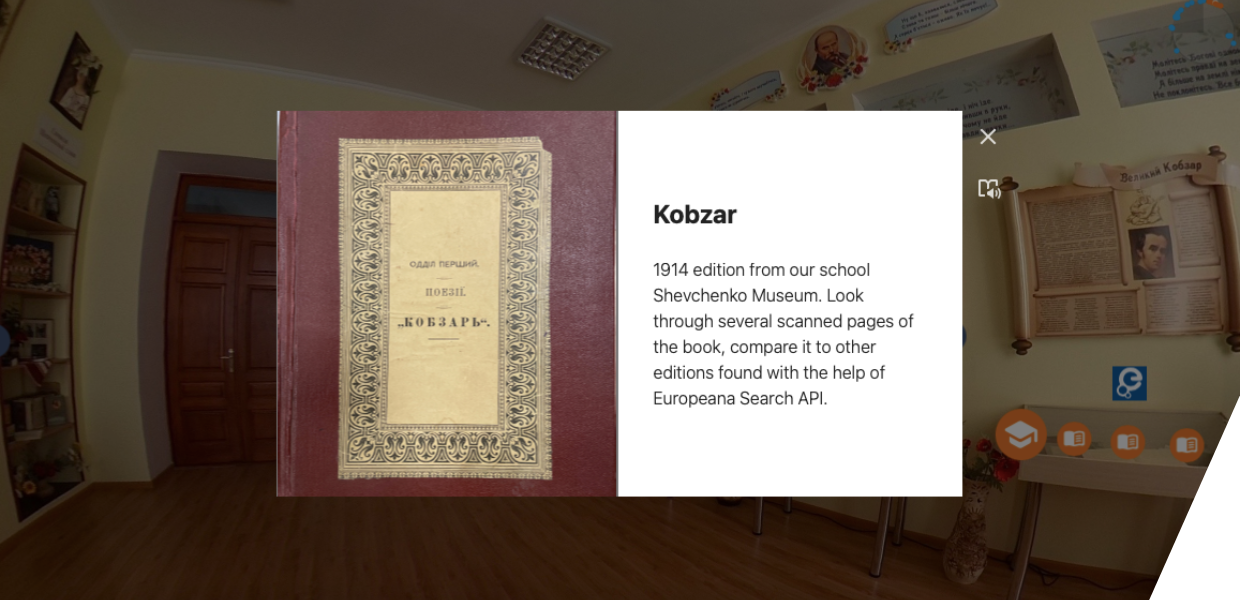In this interview, we hear from Hanna Dudich, teacher of English and vice-principal; Halyna Tkachenko, teacher of Ukrainian Language and Literature, vice-principal; Oksana Strekalovska, ICT teacher, class tutor of the participating students, a vice-principal; and Olena Tarasova, Artem Havryliuk, Anna Prytula, Vladyslav Dobrunov, students of the 10th form, Low-Code Fest participants.
What did your project want to achieve?
Halyna Tkachenko: The goal of the project was to popularise the name of Taras Shevchenko, a famous Ukrainian writer, who is a symbol of our nation, to preserve the historical memory of the people and their achievements. We also wanted to involve learners in research and creative activities.
Hanna Dudich: The project that we produced to do this, ’VR Kobzar’ consists of a virtual tour in the Taras Shevchenko museum (situated in our school). It was made with the help of a ThingLink tool on the school website, and links the Museum’s exhibits with local library digital content and with the digital content of European libraries via the Europeana Search API. The idea was to research the similarities and differences between PDF versions of different historic editions of Shevchenko's collection of poems called ‘Kobzar’, located in our school Shevchenko Museum, in the Regional Chizhevsky Library and in various libraries across Europe.
How did you use Europeana's APIs and data from Europeana in your project? How was your experience of using them?
Oksana Strekalovska: After getting acquainted with the functionality of Europeana’s APIs at the Low CodeFest webinars, it was clear to us which API to choose and how it could enrich our project. We made a search engine using the Europeana Search API and created a tool within the VR tour to search for scanned copies of Shevchenko’s works located in cultural institutions worldwide. The 10th form IT students were involved in this project. ‘VR Kobzar’ benefited greatly from using the Europeana Search API because it added the possibility of research work turning students from consumers of a VR product to its creators and researchers. The students are already thinking of using Europeana APIs in other educational projects.
Did you use any other technical tools that you had never used before?
Hanna Dudich: We had used both Thinglink and Canva for other educational purposes, but 'VR Kobzar' was the first time that we used Canva to create customised tags for Thinglink. At the Low-Code Fest we had a possibility to talk to experts during mentoring sessions and it was a really valuable experience. They gave us helpful advice, introduced us to new tools and showed new features of already familiar ones.
Oksana Strekalovska: We also used WebStorm - an integrated development environment for JavaScript – to create search engines with the help of HTML, CSS and Europeana API.
We would love to hear from your students directly - what was the most valuable thing that they learned from the programme?
Olena Tarasova: In my opinion, the most valuable thing they learned while working on the project was teamwork and mutual understanding. Before the war, we had often worked on projects together, but now we don't go to school everyday, we mostly study online. This project united not only students and teachers but also countries, and it's a really good and valuable experience. Also, we could master the English language in the field of information technology, which is very important and really fascinating.
Artem Havryliuk: This event was useful and interesting for me. I tried and practised my skills. It was interesting to work in a team, this was a good experience for me. Such events are great for improving IT and group work skills.
Anna Prytula: First of all, the most valuable thing for me was working in a friendly team together with teachers and classmates. Joint meetings and conversations inspired us for great creativity, which resulted in ‘VR Kobzar’. I enjoyed listening to very smart and talented people - the mentors - who inspired us to create this project, to learn more about IT design. I was very happy to take part in the Low-Code Fest and delve into the world of IT.
Vladyslav Dobrunov: I have improved my logo and web page design skills and abilities. I realised that it is necessary to know the history of the country and its people to be able to tell others about it, because without the past there is no future. At this time, it is very interesting to travel in the virtual world.
Where can people find your project, or learn from your work?
Halyna Tkachenko: The ‘VR Kobzar’ is a VR tour of our school Shevchenko museum which can be found on the school website. The school Shevchenko museum is part of our learning environment. Here, children learn to select information and conduct excursions not only for students of our school, but also for learners of other educational institutions as well as for adults. The museum welcomes visitors from all over the region. Now with the digital VR tour new learning opportunities will be available for a wider audience.
What's next for you/your team?
Hanna Dudich: We'd like to continue to promote the project on social networks and invite other students nationally and internationally to explore our educational VR experience. Taras Shevchenko was not only a poet but also an artist. So we'd like to develop our project further by enriching the VR tour with other Europeana APIs and providing the ground for the research in the field of art by searching and exploring Shevchenko's paintings in European art galleries and museums. We'd also like to present the project at a national educational conference to share innovative teaching practices with colleagues. And of course, we are excited about presenting the project at the Europeana MOOC and attending Social Hackathon Umbria this summer.
Find out more
Explore and use Europeana’s APIs or discover more opportunities to use digital cultural heritage in education by signing up for the upgraded ‘Digital Education with Cultural Heritage’ 2023 MOOC.


